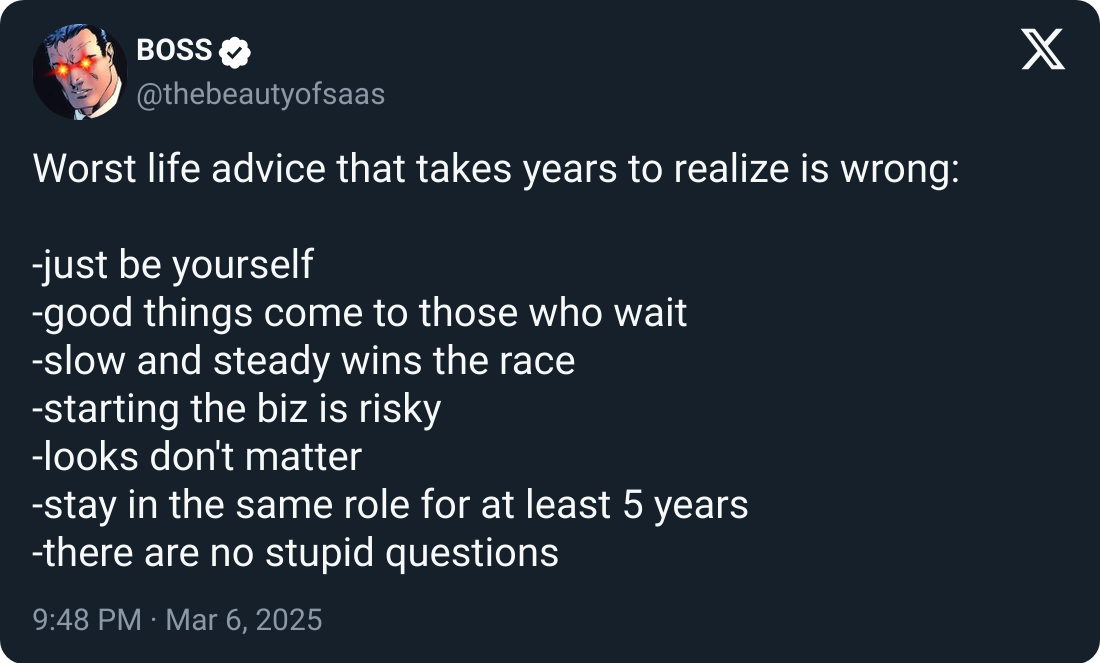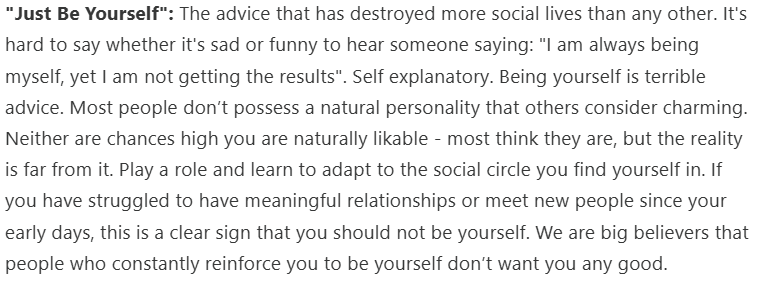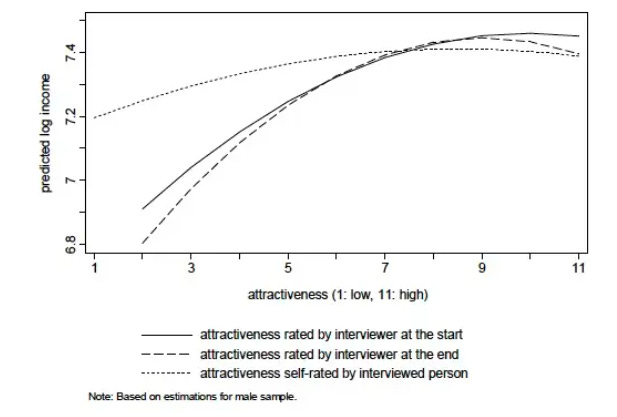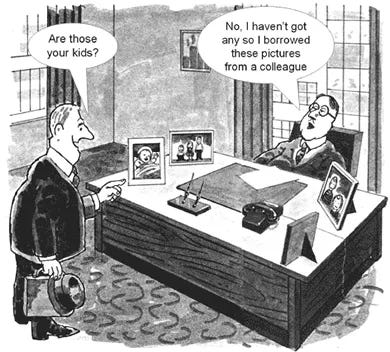The Advice People Give When They Don’t Want You To Win
80: The type of advice you want to avoid
Welcome reader! We hope this post won’t go unnoticed since the topic is present in each one of our lives, and will continue to do so. You are given advice by someone, but are not sure how to position yourself? This post is for you.
What You Need To Know About Advice
What makes common advice bad: To put it into practice. Let’s consider a basic example. Assume someone wants to communicate better and improve their social skills (source). They have been told their whole life that they are introverts. Meaning that they have not been doing the best when it comes to it. Next comes human nature and the psychology behind it. Who do we trust and go to with our questions to seek the best advice? To the best communicator/speaker we know. Why? Well, they know it best at the end of the day. This is a perfect approach in theory. This approach misses the same person who is winning regarding their social skills and always had it easy… Is not an introvert but rather an extrovert. Meaning? They didn’t struggle with it at any part of their life. Quite the opposite. Final question and one that should make the most sense. Why would the person who has had it easy their whole life be the right person to ask for advice? It doesn’t make much sense when you think about it. This principle applies to advice as well. 80% of the advice you will be given comes from a different place. As a result, the same advice may not work for you.
As a general rule, people ask for advice only in order not to follow it; or if they do follow it, in order to have someone to blame for giving it. - Alexandre Dumas
Advice that works: Finding those with a similar starting point and building from there is how to obtain advice that works. Better said it is only worth taking advice from those who fit that criteria. It doesn’t mean that others’ advice is useless or not applicable. It means that their talent was the one that pushed them through and not the methods or techniques they used to get where they are. There is a big difference between the two. Another point worth mentioning is that those who offer unsolicited advice? It’s often driven by ego and lacks results. Those who understand what works and know what they are doing don't go around and give their advice unless someone asks for it in the first place - is nothing for them to gain from it.
Why you should not give advice: Similar to the above. The reason you should not give advice is because 1) it does not apply to others, and 2) the majority don’t want advice anyways. There are better ways to spread your message and help others. Such as creating a personal brand or starting a newsletter (source). In most cases, when someone asks for advice, they don’t want it in the first place. Before someone asks you for advice. There is a point at which they have already made their decisions. The reason they are asking for the advice is because they want reassurance and to check if they made the correct move. Why are we mentioning this? Giving advice can lead to frustration if the other side doesn’t act on it. This is the exact thing someone who has already decided will do. Suppose your advice is not going hand in hand with their advice. They will ignore it. Imagine having someone you spent hours trying to help be stuck on the same problem you gave them an answer to months ago. Save your time and patience - you can’t help those who don’t want help.
Types Of Advice To Avoid
From an earlier post on the social skills (source).
Expanding on just be yourself (JBY): This is a perfect opportunity to mention the most common advice given to others: just be yourself (JBY). JBY may be the type of advice that has led to more mediocrity and wasted potential than anything else. You are not good at social skills? Just be yourself. You are not good at presenting during business meetings? Just be yourself. Trying to land a client but having a tough time? Just be yourself. Funny enough. This advice often comes from those who excel in their field. To not sell you any fluff story. If you are not good at something and want to become better. Just being yourself is terrible advice. Think about it for the moment, and it will make things clearer. Neither will it help you to ask for advice from those who naturally have been good at it… Better said it will keep you stuck in the same place you have always been - since they cannot give you advice that will apply to your situation (they have always been good at it). This is something you want to avoid.
Follow your dreams: How often have you heard movie one-liners and common advice like this one? Follow your dreams. This advice would work if you gave it to someone in their 30s+ financially independent. Why? After your 20s, your vision and understanding of yourself reach a new level. Until then? Most in their 20s don’t know what they want in the first place. If your dream changes every year, how can you realistically follow it? What happens when you chase a different dream each year? You end up in the same place you were before. Nowhere. When you compare this to someone who commits to one or two things (source) and ends up putting all their time into it… You realize it is hard to compete with that. It doesn’t take a rocket scientist to see why this advice is bad. It keeps you in the same place and will continue to do so if you are not 100% inline with your vision and goals. The worst part? It is always preached to younger generations - making it completely useless.
Do what you love, and you will never work a day in your life: The sooner you realize that this is nonsense… The better. No matter how much you love something or enjoy it… There is no chance of achieving anything impressive or producing results that impress others without effort and hard work. Yes, it is easier to do so. Yet, most who advise this don’t consider one thing. As soon as you start doing something you have always dreamed about. There is a good chance that a year later you will hate it. Making this advice a terrible one. When you think about this advice, it is a good idea on a short-term basis. But in the long run, it doesn’t make much sense. We should all strive to find what we are talented at and stick to it. To make our work feel as effortless as possible. This is a common pattern among high achievers - they are so good at what they are doing - that they don't feel tired doing it for hours and hours. The results? It is self-explanatory. More hours equals better results. Our take on this advice? Work on finding what you are good at. Once you find the balance between doing what you love and what you are good at. If you grow tired of one, this approach will support you. Meaning you always have a backup. There is a good chance you will end up hating what you thought you loved.
Good things come to those who wait: Painful one. It has kept more A players in the C league than anything else. When you think about it, good things never come to those who wait. To break it down further. This type of advice has both positive and negative aspects. The positive side is that when you have something going and are improving your life things do take time. No one can deny that. Often there comes a point where you feel you have reached your maximum and need to wait to move to the next point. Quite common for those who have been in the business for 3 to 5 years. Everyone can remember how they struggled at one point until they implemented something new and achieved results they never achieved before. The ones who struggle with this advice are those who don't have anything going on for them. That is the big negative, and often this is the case when this advice is given. What will those with nothing going on in their lives do? Wait. The problem with the waiting game is that it won’t bring you any good. Luckily, most reading this website fall into the first category where you understand that this type of advice is good *only* if you are already doing the required work. Otherwise, you will end up wasting your most precious resource. Time.
Slow and steady wins the race: Statement - advice that is simply not true. If you don't believe us. Reflect on your social circle. There is a pattern that those who are slow and ineffective are often the ones who have much to show. Those who are fast and execute often? Those are winning in the end - ones betting on the momentum and execution. This advice can be interpreted in multiple ways and getting the main message out can be problematic. The reason is that humans operate on extremes. On the one hand, people wait for a miracle to happen without taking action. On the other hand, some do a lot without wasting their time. Both approaches have their positives and negatives. However, advice such as this rarely works out as most people fall into the first category. Where individuals don’t even start in the first place. Those who rush things and execute them? They are the ones this advice would apply to. Usually, a problem - bottleneck gets removed over time, and results start showing up. Those who are not doing anything in the first place? Those are the ones who stay in the same place.
Interesting read from a business insider (source).
Looks don’t matter: This is complete nonsense and anyone who has done client work or works in a corporate office where politics are at play understands this is wrong. More attractive people typically get better grades, easier promotions, and higher salaries. Physical appearances influence perception. Meaning that subconsciously, people who are more attractive to others are viewed as more trustworthy and competent (source). This makes even more sense when you realize that life should be treated as a form of sales (mindset). When it comes to work and presenting yourself - selling yourself, this type of advice is a common trap. Everyone who has ever hired someone or has had any decision-making power. Knows that people who look better or at least put effort into looking better get better results. This doesn’t mean you should spend hours on your appearance, but it does mean that you should regularly care for your health, hit the gym and get a haircut. Those are the minimums.
Be humble: This advice is tricky because everyone has a different view of what humility means - exactly why it is not something you want to practice. Yet, you will often hear this advice. Does being humble mean you will not push yourself outside of your comfort zone? Does it mean you should not be thinking big enough? Maybe it means that if you already have something going for yourself, you should not be bragging around? Hard to pinpoint. We agree that no one should walk around bragging about what they have in their lives. Look at the crypto people who brag and what has happened over the years (source). You don't want a target on your back. Should you be humble if you are helping others with your business and promoting a product that improves lives? Definitely not. This is where most get this advice wrong. The difference lies between bragging about how good your life is and promoting your product to help others? Night and day. That is the exact reason why this is terrible advice. If you can’t distinguish when to brag and when to be humble… Most people operate on extremes, which means they can’t... This advice is a waste of time.

There are zero reasons to get into X. It is a scam: Young readers won’t relate to this. The Internet was a scam at first. Early e-commerce was a scam at first. Crypto was a scam at first. Now? The Internet has over 5 billion users. E-commerce revenues are around 7 billion dollars per year. The first major crypto coin? You can see how things are progressing in the graph above. The problem with this advice is that it excludes you from participating or having the chance to hit it big. We are not the ones who will sell you dreams. Living to hit it big once and then taking it easy is a lifestyle trap (source) and can lead to a miserable life. Does that mean you should stop pursuing or participating in the next big thing? No. You should be smart enough to recognize the risks that it brings. Trying to understand and predict whether it will age in the future, and will it become the new normal. Betting on the future is how you gain a competitive advantage. Being an early adopter of the latest technology, method, or space creates real wealth since you have space to maneuver. Those who tell you something is a scam when no one else has heard about it, or it is a small niche that no one knows about yet... That is something you should pay attention to. Those are usually gold mines.
It is risky to start a business, so don't start one: This advice directly comes from the old world (source) and how things used to work in the past. Those days have passed. For those who have been reading our advice on how to build a business and what it takes. We are talking about the worst-case scenario if your business fails and you have followed the right methods and minimized risks (source). You are looking for minimal material damage. We would go so far to say you are looking at none if you have done everything right. Spending $200 for the unmatched experience and knowledge you can leverage? It is a win-win situation. No matter whether your business succeeds or fails. Making this type of advice something that people should take seriously anymore. What is the only thing to keep in mind when starting a business? You want to ensure you don’t become a wannabe business owner (source) but a real one.
Stay in the role for at least a few years: This is another old world advice that hasn’t aged as well. What used to earn you points and extra credit 20 -to 30 years ago doesn’t work today. If you want to maximize your income and career position. Jumping the ship each 2 to 4 years (there is no single answer as it depends on - position, industry etc) will get you much further. It will always keep your salary above the industry average and present you as a professional with more experience than others. We understand both arguments of this story. How one brings you more general knowledge, and how others working in one company for years give you full company expertise. But this is something that those in the corporate environment trying to escape it (source) need to understand.
There are no stupid questions: If you told your work colleague or any other normie (source) that this is terrible advice… You would get stares, and people would think something is off about you. Reality? Much different. There is nothing worse than someone constantly asking you questions that could have been found on Google in under a minute. Even less so when you consider that any AI tool (which everyone should be using by now) can provide you with a solid answer, if not a full one. There are stupid questions and stupid questions have an effect, no one takes into consideration. They waste others’ time. What do wealthy (source) and successful people hate the most? Someone else wasting their time. The best you can do is avoid asking for anything that can be found on Google in less than a minute. Worth mentioning that asking questions to build rapport can be effective, but it is often done poorly and leads to a negative impact down the road. Why would you disrespect someone else's time to get what you want? When the question should be asked: 1) can’t be found on Google, 2) questions specific to the work/operations you are doing, and 3) when asking for feedback or an angle you are unsure is correct.
Life is a succession of lessons which must be lived to be understood. - Ralph Waldo Emerson
Be an open book- let people know what you think: There are no reasons to do this. Advice that is nothing but a net negative. This does not mean you should try hard and apply principles from books like The 48 Laws of Power or The Prince. Don’t do that, you will look laughable. It means sharing your views on globalization, consumer mindset, reinventing yourself (source) or how to get rich and escape the nonsense. These views should not be shared with everyone around you. Realize that not everyone operates on the same level or has the same goals as you do. It becomes easier when you understand that most can't wait to finish their 9to5 and come home to watch Netflix. They don’t care about the things you care about. They don’t have time for those things as their brains get pumped with useless information that brings nothing positive to their lives. This is one part of the story. Another part is being transparent with those around you. If you depend on someone or know you will have to spend hours with those same people. Rarely there is a good opportunity to express your feelings and tell them the truth. No one wants to hear the truth in the first place. The truth hurts. What about your feelings, and sharing what you think? That could be used against you and by those who don’t care what methods they use to get what they want. Remember most fall into that category.
Money exists to spend it: That is true if you want to waste your life on material items that will excite you for the 2 days. Reality is that happiness won't come from purchasing material possessions after a certain point. This realization comes at one point where you are comfortable with your life. Less so if you are not trying to impress others. Does this mean you should be frugal and save every penny? No, it does not. However, it also doesn’t mean you should max out your credit card each month buying unnecessary things. Everyone goes through this phase if you come from a poor background and have never had the chance to experience the stuff. The moment you start sensing that everything is turning in your favor. There is truth in that. Some people move out of this phase quickly, while others never get it out. It also depends on your character and sense of what brings you joy. Nothing wrong on both parts. However, this advice often comes from those who should not be giving it in the first place. If you're not set with your financial goals and don’t have to worry about what happens tomorrow (comfortable enough), this advice is nonsense. You are better off buying assets and learning to invest your money (source). Doing so ensures you get your time back and won't find yourself in your 50s worrying about going to work tomorrow.
You are average - not special. We left this one for last. It is hard to consider advice, but it should fall into this category. Sooner or later, you will come across someone who advises you in a way that makes you feel average. What is wrong with this? Accepting that you are average. The moment you accept that you are an average person is the moment you have lost. It is a huge trap you can fall for. It is a defeat. One that sets a tone for your life position. What you want is to always believe in yourself that you are different. Better. More efficient. Smarter. Be humble, but recognize that you are not like everyone else around you. Knowing how to do this without looking down on others is the key to a good life…
Disclaimer: None of this is to be legal or financial advice of any kind.
Additional Material: Available by clicking here for paid subs.
Scraping Impossible: Looking to acquire leads for your business? Use the best tool on the market by clicking here.









appreciate it, gentleman.
Fuck Yeah Bro, the last tip I personally went through with an old colleague literally shouting and at me saying that "you're not better than us". Talk about Insecurity I guess they don’t want to see me shine. Anyway's thank you bro needed to be reminded of this trap. Also I will be becoming a paid subscriber soon.